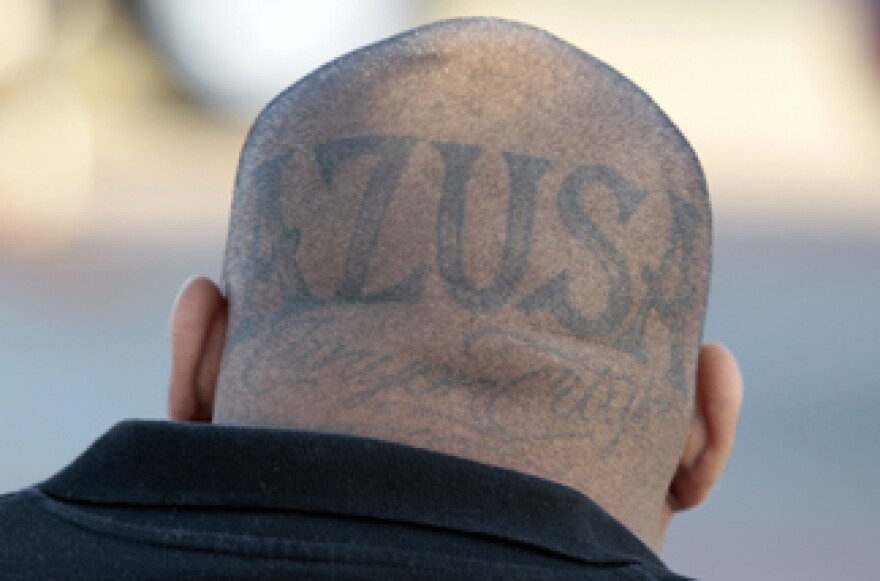Truth matters. Community matters. Your support makes both possible. LAist is one of the few places where news remains independent and free from political and corporate influence. Stand up for truth and for LAist. Make your tax-deductible donation now.
This archival content was originally written for and published on KPCC.org. Keep in mind that links and images may no longer work — and references may be outdated.
Federal indictment says Latino gang Azusa 13 targeted African-Americans

A federal indictment unsealed Tuesday accuses a Latino street gang in Azusa of trying to push black people out of the city. Authorities say it marks only the second time they’ve used federal civil rights laws against a criminal street gang.
U.S. Attorney Andre Birotte said the Azusa 13 street gang began its campaign around 1992, after a meeting of its leaders in the city’s Pioneer Park.
“The indictment alleges that nearly 20 years ago, the Azusa 13 adopted a racist principle to harass and use violence in an effort to drive African-Americans out of the city of Azusa," he said.
Azusa is a city of about 50,000 people at the base of the foothills of the San Gabriel Valley, just off the 210 Freeway. More than two-thirds of its people are Latino. About 3 percent are black.
Police Chief Robert Garcia said Azusa 13’s attacks included scrawling racial epithets on African-Americans’ homes and street violence that last year targeted a high school student walking home from a track meet.
“He was African-American," said Garcia. "Some young Latinos saw him, chased him, and basically yelled racial epithets at him, and attacked him.”
Animosity between Latino and black gangs competing for drug territory is common. It’s unclear why Azusa 13 might have gone further with attacks on non-gang members.
Garcia said recent raids turned up a lot of potential evidence. “Hopefully we are going to find something written or on a USB stick or on a laptop," he said. "Some of these guys have Facebooks. They do all that stuff. So we’re hoping we can find something.”
The chief also said investigators hope to find more evidence of a business plan the gang allegedly developed to control drug sales through intimidation and violence.
Federal prosecutors have charged six alleged Azusa 13 members on civil rights violations. Another 40 alleged members face federal or state narcotics charges.
This is not the first Southern California gang accused of racially- motivated attacks. The Avenues in Highland Park, Varrio Hawaiian Gardens and Florencia 13 in South L.A. are all Latino gangs whose members have faced state or federal civil rights charges for attacking and killing African-Americans.
All had close ties to the Mexican Mafia gang that imposes racial segregation inside the state’s prisons. U.S. Attorney Birotte said Azusa 13 did too, but he can't say there's an edict to local gang members to rid communities of African-Americans. That’s long been rumored, but never proven.
Another law enforcement source said it’s unlikely that Azusa 13 did anything without the mafia’s approval. With its network of supporters in and out of prison, the Mexican Mafia collected drug taxes from Azusa 13 and protected its members, the indictment claims.
Chief Garcia said his city has worked hard to address racial animosity in the city after reported hate crimes spiked in the late 1990s in part because of Azusa 13.
“We created a human relations commission. It's made up of community members of all races to help promote diversity and tolerance," he said. "We introduced programs in our school district with school-aged children to promote diversity and tolerate.”
Despite the bust, Azusa 13 may continue as a major presence in the city. Police estimate that 400 people claim membership.
The police chief and federal authorities promised to maintain pressure on the gang, and to continue the fight against its racial ideology.








